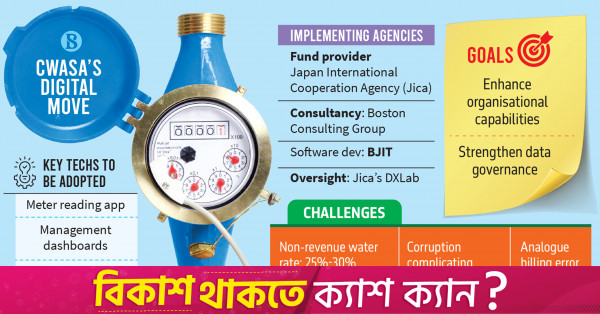Ctg Wasa goes digital to boost efficiency, reduce water loss


Chattogram Wasa is integrating modern technologies such as a meter reading app, management dashboards, and non-revenue water monitoring tools to enhance its institutional management.
This initiative, funded by the Japan International Cooperation Agency (Jica), aims to implement the organisation’s target data architecture, enhance organisational capabilities, and strengthen data governance.
Recently, Boston Consulting Group, hired by Jica in February, recommended 26 digital initiatives to implement data architecture for Chattogram Wasa after comparing management and water supply companies in Brazil and India.
In May, software company BJIT Ltd was appointed to develop a meter reading app, management dashboard, and non-revenue water monitoring tool, all slated for delivery by October. The entire project was overseen by Jica’s DXLab.
Md Nurul Amin, supervising engineer at Chattogram Wasa, told The Business Standard, “If implemented, the project promises transformative benefits, ensuring equitable distribution in the water supply chain from customers to the institutional level.”
Over the past 15 years, Chattogram Wasa has invested over Tk7,500 crore in three projects to improve the city’s water supply system, increasing daily water production from 12 crore litres to 50 crore litres.
Currently, two projects totalling Tk5,800 crore are underway, with an additional six projects costing nearly Tk30,000 crore in the pipeline.
Despite these investments, challenges persist, including a non-revenue water rate of 25%-30%, well above the global standard of 5%, resulting in unaccounted water valued at Tk14-17 crore monthly.
Allegations of corruption among officials, including meter inspectors in the revenue branch, have further complicated revenue collection.
According to Jica project documents, Chattogram Wasa currently takes care of production, management, and reporting through Excel-based methods, with a fully analogue billing system.
The agency oversees 88,771 connections, comprising 82,642 residential and 6,129 commercial connections, managed by 43-meter inspectors through the IT department.
The billing process, from meter reading to collection, spans 12 weeks and incurs a 30% error rate due to its analogue nature. The agency aims to automate this system with new technological integrations.
The upcoming mobile-based billing system will utilise a meter reading app, enabling inspectors to input meter readings directly. Automated billing will be based on customers’ billing histories, with bills delivered via pocket printers and payments accepted through QR codes.
The app will also feature GPS tracking to verify meter readings and ensure accurate billing. Additional functionalities include offline operation, data verification, and roster management, facilitated by JICA’s provision of 100 mobile phones, mini printers, and 20 tablets.
The new management dashboard will initially focus on billing-related information, supporting report generation, billing and collections, alerts and triggers, KPI tracking, collections user management, user management, audit trails and monitoring, triggers management, and notification management.
Meanwhile, non-revenue water tools will monitor non-revenue water distribution, leakage detection, pressure analytics, consumption analytics, geospatial analytics, water production analytics, supply monitoring, reporting, KPI tracking, user management, and notification management.
Once fully integrated, these technologies are expected to drive Chattogram Wasa towards becoming a data-driven organisation, facilitating discussions for future investments, aligning budgets and resources, and providing a technical blueprint for future technological advancements.
Ruman Dey, chief revenue officer at Chattogram Wasa, told TBS, “The features of these apps and software are highly promising. Inspectors can now input readings, including meter photos, directly in front of customers.
“We can also detect illegal connections and deep tube wells. With enhanced water production and supply monitoring, we anticipate a reduction in non-revenue water and increased revenue.”
As per documents from the Jica project, Chattogram Wasa has received partial loan assistance for the two ongoing projects, with another project awaiting approval.
Jica has allocated Tk773.44 crore for Phase I and Tk2,892.50 crore for Phase II of the Karnaphuli Water Supply Project and is expected to provide partial loans for the Kalurghat and East Baklia catchment projects, estimated to cost Tk7,200 crore, as part of the Chattogram city sewerage master plan.
Makshud Alam, the chief engineer of Chattogram Wasa, told TBS, “Jica is actively improving institutional management post-loan disbursement for development projects. They are focused on achieving projected revenues from these projects, crucial for loan repayment from our earnings.
“Jica is also providing technical assistance to ensure that the investments deliver their intended benefits.”




